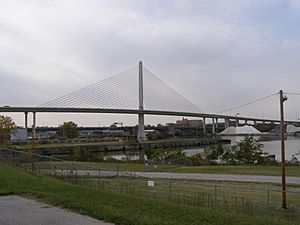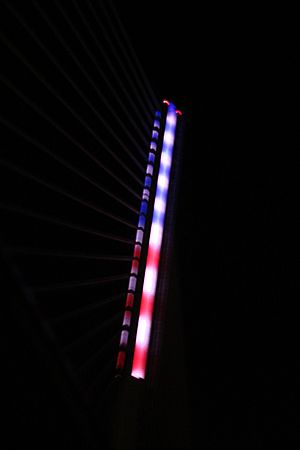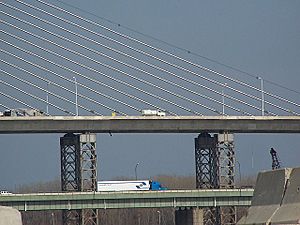Veterans' Glass City Skyway facts for kids
Quick facts for kids Veterans' Glass City Skyway |
|
|---|---|
 |
|
| Coordinates | 41°39′35″N 83°30′47″W / 41.65972°N 83.51306°W |
| Carries | 6 lanes of |
| Crosses | Maumee River |
| Locale | Toledo, Ohio |
| Official name | Veterans' Glass City Skyway |
| Maintained by | Ohio Department of Transportation |
| Characteristics | |
| Design | cable-stayed bridge |
| Total length | 8,800 feet (2,682 m) |
| Height | 400 feet (122 m) |
| Longest span | 612 feet (187 m) (2x) |
| Clearance above | 130 feet (40 m) |
| History | |
| Opened | June 24, 2007 |
The Veterans' Glass City Skyway, often called the Toledo Skyway Bridge, is a very special bridge in Toledo, Ohio. It's a type of bridge called a cable-stayed bridge, which means it uses strong cables to hold up the road. You can find it on Interstate 280.
This amazing bridge opened in 2007 after some delays. It helps cars move much faster across the Maumee River. Before the Skyway, traffic often got stuck on the older Robert Craig Memorial Bridge. The Skyway project was the biggest building job ever for the Ohio Department of Transportation (ODOT).
Contents
Building the Skyway Bridge
The ODOT and the city of Toledo started planning this huge bridge in 1999. Their goal was to build a bridge about 8,800 feet (2,700 m) long. This bridge would stretch over the Maumee River and the low lands next to it.
The people of Toledo chose a "glass" theme for the bridge's design. This was to honor the area's long history of making glass. A company called Figg Bridge Engineers, Inc. designed the bridge for ODOT.
How the Bridge Was Built
Construction of the Skyway Bridge began in 2001. The main part of the bridge, which goes over the Maumee River, is a cable-stayed bridge. It has one tall tower, called a pylon, and two main sections of road. Each section is about 612 feet (187 m) long on either side of the pylon.
The parts of the bridge leading up to the main section are also very long. About 4,000 feet (1,200 m) of the bridge is north of the river. Another 3,350 feet (1,020 m) is south of the Maumee River. The bridge finally opened for cars on June 24, 2007.
Bridge Features
The Skyway Bridge has three lanes for traffic going in each direction. This helps a lot of cars cross at once. The road itself is very high up, about 130 feet (40 m) above the Maumee River. This allows tall boats to pass underneath easily.
Building this bridge was a huge project. It cost about US$237 million, making it the most expensive project ever for the ODOT.
Amazing Lights and Design
One of the coolest things about the Skyway Bridge is its single tall pylon. This pylon has 384 special lights called LEDs. These LEDs can make over 16 million different color combinations!
The lights shine through glass panels on all four sides of the top 196 feet (60 m) of the pylon. You can see these bright lights from as far as 3 miles (4.8 km) away. They often light up in different colors for holidays or special events.
The bridge also uses a new way to hold its cables, called a cable-stayed cradle system. This system is very strong and helps the bridge last for more than 100 years. It also makes it easier to check and replace parts of the cables if needed.
 | William Lucy |
 | Charles Hayes |
 | Cleveland Robinson |



